The Gift of South Dakota
Subscriptions to South Dakota Magazine make great gifts!
Subscribe today — 1 year (6 issues) is just $29!
The Last Lakota Code Talker
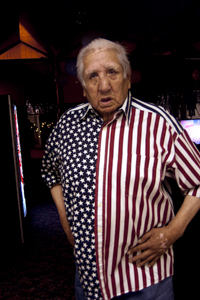 |
| Clarence Wolf Guts, the last Lakota code talker. Photo by Bernie Hunhoff. |
Clarence Wolf Guts was not the sort of hero who capitalized on his exploits; he never wrote any books or ran for office, and you could count his speaking appearances on one hand. When we met him in 2007, he was living almost as simply as he did when he was a boy on the Rosebud Reservation in the 1920s.
Much about Clarence Wolf Guts is confusing, beginning with his name. He didn’t know what he was called when he was born on Feb. 26, 1924 in the Red Leaf community on the Rosebud Reservation of south-central South Dakota. His birth certificate listed him as Eagle Elk, but his father and uncles soon decided to give him a more unusual name — Wolf Guts.
He learned Lakota from his grandfather, Hawk Ghost, and his grandmother, Hazel Medicine Owl. “My grandfather taught me the facts of life and the Lakota language,” he said. “He told me ‘you’ll go to school and stay in school.’ But he also said to speak Indian because ‘you’ll need it later in life.’”
He and a cousin, Iver Crow Eagle, left the boarding school they attended in St. Francis in the eleventh grade to fight in World War II. “I didn’t know if I could make the physical in Omaha,” he said. “I had a perforated ear drum. I guess a bug got in there when I was a little kid. My grandmother took tweezers and pulled the bug out, and hurt my ear drum.”
But it was 1942, and the U.S. Army wasn’t fussy. The cousins were assigned to hand-to-hand combat training in Tennessee, desert exercises in Arizona, and finally to Ranger training at Camp Rucker in Alabama.
Wolf Guts recalled with considerable detail the day he became an important player in the war effort. A captain came to his barracks and asked, “You talk Indian?”
“I am Indian. One hundred percent Indian.”
“Well, the general wants to see you.”
“Me?” wondered Clarence. “What in the world did I do now?”
The captain told him to get a haircut, take a shower and dress in his best clothes. He also offered tips on military etiquette: stand two feet from the general, salute, say your name, rank and serial number. Then he and the captain went to see the general. “Sir, this is Clarence Wolf Guts from South Dakota,” said the captain. “He talks Indian.”
Major General Paul Mueller, commander of the U.S. Army’s 81st Infantry, poured glasses of whiskey for the three of them, and told Clarence he wanted a man-to-man talk — “none of this ‘sir’ or ‘general.’ Just talk to me like a man.”
“Can you speak Indian fluently?” the general asked. Clarence said he could “read, write and speak the Lakota Sioux language.” Satisfied, the general explained that the Japanese were intercepting vital communications, and he intended to confuse them by sending messages in a Native American language.
Clarence told the general, “I don’t want no rank, I don’t want no money. I just want to do what I can to protect America and our way of life.”
“I’ve never seen or met an Indian before,” the general said. “You guys were first in this country?”
“Yes, supposedly we were,” replied Clarence.
Gen. Mueller said he liked his spunk. Then he asked if he knew of any other soldiers who spoke Lakota. Clarence said his cousin, Iver, was also at Camp Rucker, whereupon Gen. Mueller exclaimed, “I hit the jackpot!”
Two other Lakota from South Dakota — Roy Bad Hand and Benny White Bear — were also recruited. The four learned how to operate military radios, and they worked with officials to develop coded messages. They developed a phonetic alphabet and assigned military meanings to common words like turtle, tree or horse. Their communications helped the army to move troops and supplies without tipping off the enemy.
Clarence Wolf Guts, just by the good fortune of staying alive, became one of the most acclaimed WWII vets in South Dakota.
Clarence was Gen. Mueller’s personal code talker and traveled with him and the 81st as the division moved from island to island in the Pacific, headed for Japan. Iver accompanied the general’s chief of staff. Even though they had special protection — two bodyguards were assigned to each code talker — Clarence still shakes when he thinks of the bullets, mortars and bombs.
Frustrated by a language they didn’t know, the Japanese made special efforts to find the code talkers. Some code talkers in other units later said that if their outfit was overrun, the bodyguards were expected to shoot the code talkers to prevent their capture by the enemy. Clarence and Iver never spoke of that, but they had enough to worry about.
“How will we ever survive this?” Iver asked Clarence on a particularly harrowing day.
Clarence replied, “There is a God. He is protecting us.”
Thoughts of the Rosebud Reservation provided some comfort. “I always wondered if they had food on the table, if they’re dancing, if they’re remembering us,” he said.
Clarence started to drink heavily in the army. “We went to war and war is hell,” he said. “All I can say is we went to hell and back.” He and many others found at least temporary relief in the bottle. “It’s easier that way to take another man’s life,” he said.
As radio operators, they had access to another avenue of escape. “We could tune in the radio to the U.S. and get western music from San Francisco,” said the old soldier. “We could hear You Are My Sunshine and Chattanooga Choo Choo.”
They even got some kicks while on duty. Clarence started laughing one day while transmitting a message to Iver. “Are you laughing at me?” asked Iver. “No, I’m laughing at the Japanese who are trying to listen to us,” Clarence said in Lakota.
Decades later, a Japanese general admitted that his country’s top cryptographers couldn’t decipher the code talkers’ language. When told it was Native American he replied, “Thank you. That is a puzzle I thought would never be solved.”
When the war ended, Clarence and about a dozen other Lakota code talkers returned to the reservation. They were not welcomed home with parades or programs, but he and a few soldiers held their own party, dancing and singing a song of thanks that they’d learned from Indian elders. Asked about it many years later, he said the dance of thanks wasn’t for the dancers. “We did it for our people and the people of the United States of America. It was for them, and for the people of the world, because if the Japanese ever took over the world, we would be dead.”
Code talkers from other Indian tribes were asked to not talk about their unique roles in the war, perhaps because the U.S. military thought it was a trick worth saving. All written reports about the code talkers were classified. Clarence didn’t remember being told to keep his service record a secret, but he and his fellow Lakota soldiers, happy to be home on the Rosebud Reservation, told no one. They didn’t think of their services as particularly heroic. Like many veterans, they tried to forget.
“I wanted to be a rodeo man,” he said. I rode three bulls, and then I said ‘I’ll stick to horses.’ Those bulls can kill you.” He was a bronc rider at rodeos in Valentine, Gordon, Rapid City, White River, Fort Pierre and other West River cow towns.
He earned $100 on a good weekend, but spent it on alcohol and gas to get to the next rodeo. In 1949 he broke his ankle at Cody, Neb. and soon retired from the arena. A year later he married Allgenia Brown. They had two daughters and a son before divorcing in 1959.
He worked on farms and ranches, on or near the reservation. Heavy drinking kept him from accomplishing very much; and it also caused his greatest sorrow. He attributes both of his daughter’s deaths to alcohol, and he says many of his other relatives suffer from alcoholism.
But his life took a turn when the silence surrounding the role of the code talkers was lifted. It began when the military declassified official information about its linguistic trickery. Then Max Collins wrote a book, Wind Talkers, about two Navajo code talkers. The book became a hit movie in 2002. The U.S. Congress awarded congressional gold and silver medals to the Navajo soldiers, and the story spread. Over a hundred code talkers were identified from 17 tribes. Unfortunately, by then almost all the other code talkers had died. Clarence Wolf Guts, just by the good fortune of staying alive, became one of the most acclaimed WWII vets in South Dakota.
He received an honorary degree from Oglala Lakota College. He rode in the Rapid City American Legion parade, traveled to Oklahoma City as a special guest at the opening of a traveling exhibit on the code talkers, spoke at the American Indian Veterans Conference in Wisconsin and was honored at a national WWII conference in New Orleans where he was given a red, white and blue “flag” shirt.
South Dakota’s congressional delegation — Senators Tim Johnson and John Thune, and Rep. Stephanie Herseth — introduced a bill to award him and the other forgotten code talkers the Congresional Gold Medal. Clarence traveled to Washington with the South Dakota Indian leaders, including Don Lowdner, the national commander of the American Indian Veterans Association of the United States, to testify for the legislation.
Clarence looked as uncomfortable at the senate committee hearing as the senators would look riding a bucking horse. His dark face was wrinkled and creased. His legs were so cramped that he could hardly stand. His hair was white and scruffy. Still, he spoke simple, heartfelt words to the lawmakers. “I am a full-blood Indian, and we do whatever we can to protect the United States because we love America,” he said. “Nobody can ever take that away from us.”
Editor’s Note: In 2008, the Code Talkers Recognition Act was passed, honoring all Native Americans who used their native language to aid communications in World War II. Clarence Wolf Guts died June 16, 2010, at the age of 86.
This story is revised from the May/June 2007 issue of South Dakota Magazine. To order a copy or to subscribe, call 800-456-5117.

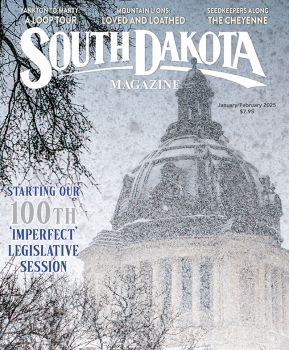
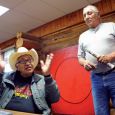
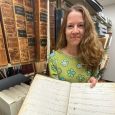
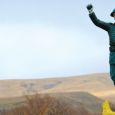
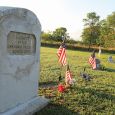
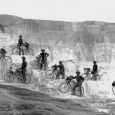
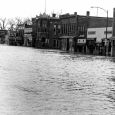
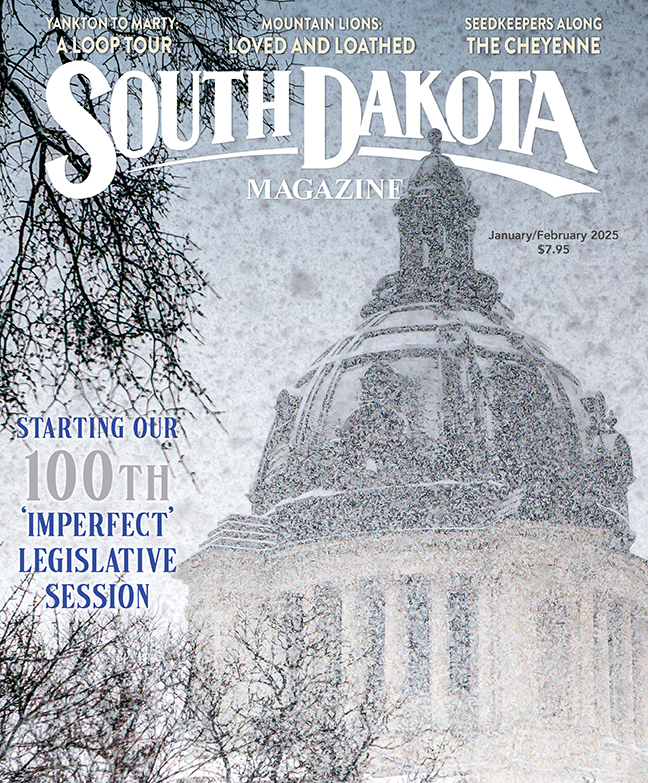

Comments
Thank you!
God Bless America!
Have a good journey in the Happy Hunting Grounds!
Love and Peace to you our Brother!
Pilamaya
Wakan Tanka Kici Un.
NATIVE AMERICAN SINGER / SONGWRITER PAYS TRIBUTE TO ALL WHO HAVE SERVED. WE THANK THEM and THEIR FAMILIES FOR ALL THEY GAVE. WE SALUTE YOUR MAGAZINE FOR KEEPING THIS STORY ALIVE.
.........FREEDOM RINGS IN THE USA
.........DON'T JUST HAPPEN 'CAUSE WE PRAY
.........THERE'S FOLKS WHO SERVED TO MAKE IT RIGHT
.........RISKED THEIR LIVES TO HELP US SLEEP AT NIGHT
.........TO ALL THE VETERANS OF THIS LAND
..........HOLD THOSE VETERAN COLORS HIGH
Playing now @ www.Allindianz.com
We are currently exploring several high-profile avenues in order to bring more attention to this NATIVE SALUTE to ALL VETERANS - PAST - PRESENT - FUTURE. Again, THANK YOU!
I lived St. Francis in 1969 and have so many wonderful memories!
Howard Courtney
Chickasaw Elderz
Tsgt. Al Johnson-retired USAF
May ALL of our indigenous warriors,
water protectors, and land defenders,
forever be honored.
A'ho
Pilamiyaye lala akicita mitawa! Wastelake!~ Aho.
May God bless the family members of these brave men who made great sacrifices for there love of America.
Once again thank you for your service & may the Great Spirit watch over your lives & protect your land.
Tunkasila yapi, tawapaha ki han oihanke sni (he) nanjin kte lo. Iyohlateya, oyate kin han wicicagin kta ca,lecamun welo.
The President's flag will stand (without end) forever.
Under it, the people will grow, so I do this.
Thank you, Clarence Wolf Guts and all of you who spoke victoriously.
More recognition is long long overdue.
May you dance the dance of peace and joy.
With Deep Honor to you,
Charyl
Bill
God Bless you and keep you always!
Waking Tanka niya waste pelo.
Many thanks.